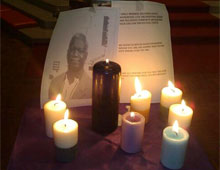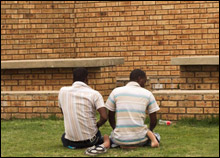Human rights reporting in Zimbabwe has been extensive in the last few years, and civics have played a monumental role in keeping Zimbabwe in the public eye – but human rights reports have a very specific mandate and a very moral intent. It is their task to keep track of what could be called “forensic truths” – the essential facts of what happened such as might be raised in a court of law – for lobbying purposes. Human rights reports are not intended to document history as it unfolds in all its nuanced realities, but to be the sledgehammer that may change world opinion, that may make it easier for refugees abroad to get asylum, that will give a voice to the voiceless and raise funds for medical and legal aid for those at the receiving end of state violence, and that will keep the record that may one day contribute to redress and prosecution or compensation. When being confronted by the shocking reality of tortured people day after day, there is neither time nor inclination to whimsically debate the relativity of narrative truths, or how subjective, partial or biased the story being told to you by the person bleeding on the floor might be. Human rights organisations work urgently and against deadlines – to get something together before the next SADC/AU/EU/UN meeting, to keep Zimbabwe in the public eye and to counteract endless ZANU PF propaganda. Zimbabwean civic groups have compiled an unassailable record of the systematic and brutal methods by which ZANU PF has remained in power since 1980. Much of this evidence relies on medical findings and lawyers’ reports, thus meeting the necessary criteria to stand as forensically accurate: somebody either has a hundred welts on his/her body consistent with being whipped with a raw hide whip or s/he does not; a lawyer either had to represent 200 peaceful protestors in police custody, or s/he did not. (Read more…)
Fri, February 15 2008 » Conflict resolution, Essays, Transitional justice » Leave a comment
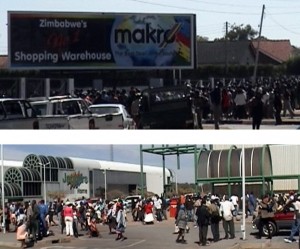
Report Cover Photo: Crowds mob South African-owned Makro and Jaggers and strip shelves bare in Harare during “Operation Slash Prices” in July 2007
Since the onset of the Zimbabwean crisis, the role of South Africa, as both a help and hindrance, has been continuously debated. In particular there has been a certain cynicism about South Africa’s policy of “quiet diplomacy” being driven by the economic interests of the South African state and its corporate sector. While this report argues that South Africa’s policy has been guided by the broader political concerns of the South African state on the continent, it is clear that the growing evidence of South African business concerns exploiting the conditions of the Zimbabwean crisis has to be looked at more carefully in terms of its on-going effects on South Africa’s strategy on Zimbabwe. (Read more…)
Tue, October 23 2007 » Economy, History, Reports » Leave a comment
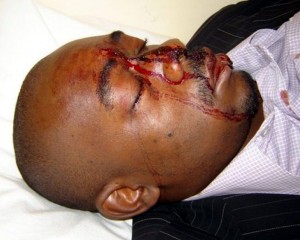
Report Cover photo: Nelson Chamisa's assailants used iron bars to beat him
The violence of 11 March and the months following in Zimbabwe indicated increased levels of state repression against dissenting voices in the country. Against the background of an enormous erosion of the political legitimacy of the ruling party, and an economy in freefall, the state has responded with characteristic brutality and contempt for its citizenry. Several features have marked the recent human rights abuses by the Zimbabwean state: (Read more…)
Tue, July 10 2007 » Global Political Agreement, History, Human rights, Reports » Leave a comment
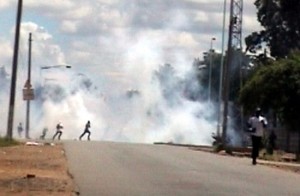
Report Cover Photo: Protesters being dispersed with tear gas
The Solidarity Peace Trust condemns the brutal assault on opposition forces and the arrests of more than 50 activists that took place on 11 March 2007, in the context of Zimbabwean police preventing a peaceful prayer meeting from being convened.
The Trust condemns the killing of activist Gift Tandare by the police on 11 March. There should be a full inquiry into this killing, with culprits brought to justice. We further condemn the shooting of two mourners at the funeral wake of Tandare, and the heartless kidnapping of the corpse by the State for hurried burial. (Read more…)
Sat, March 24 2007 » Church commentators, Human rights, Reports » Leave a comment
HOT SEAT INTERVIEW : On the programme ‘Hot Seat’ Violet Gonda talks to Professor Jonathan Moyo, Journalist Peta Thornycroft and political analyst Professor Brian Raftopoulos
Violet Gonda: On the programme Hot Seat today we bring you a teleconference with foreign correspondent Peta Thornycroft, political analyst Professor Brian Raftopoulos and independent MP and former Information Minister Professor Jonathan Moyo. This first segment centers on the controversial plans by the ruling ZANU PF party to harmonise the presidential and parliamentary elections and extend Robert Mugabe’s rule from 2008 to 2010.
It has been reported that a preliminary move to extend Mugabe’s term was approved at the conference and that the proposal has now been passed to the party’s policy-making central committee for endorsement. The next central committee meeting is expected before March. So I first asked Professor Moyo for his thoughts on this matter.
Professor Moyo: I have to correct you there, it is not true that one; there is such a proposal by the ruling party, and in any case, it’s not true that this proposal for harmonising elections in 2010 as part of Mugabe’s plan to remain in office was passed by the ZANU PF conference. In fact, the true position is that for the first time we have an extraordinary situation here without precedent, which is that a ZANU PF conference has concluded without making a single resolution. Not one resolution was formally made and passed by the ZANU PF conference. And, the reason was precisely because there was trouble over this plan, not by ZANU PF; but by President Mugabe, some securocrats and a few supporters within the ruling party who want him to avoid an election when his term expires in 2008 so that he remains for at least another two years but, with the intention of remaining there longer. (Read more…)
Tue, December 19 2006 » Interviews » 1 Comment



